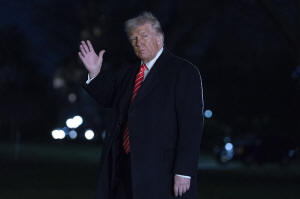Trump says he'll put a 25% tariff on countries that buy Venezuelan oil,
though the US does so itself
[March 25, 2025] By
JOSH BOAK
WASHINGTON (AP) — President Donald Trump said Monday he would be placing
a 25% tariff on all imports from any country that buys oil or gas from
Venezuela as well as imposing new tariffs on the South American country
itself.
In a Truth Social post, Trump said Venezuela has been “very hostile” to
the U.S. and countries purchasing oil from it will be forced to pay the
tariff on all their trade to the U.S. starting April 2.
The tariffs would most likely add to the taxes facing China, which in
2023 bought 68% of the oil exported by Venezuela, according to a 2024
analysis by the U.S. Energy Information Administration. Spain, India,
Russia, Singapore and Vietnam are also among the countries receiving oil
from Venezuela, the report shows.
But even the United States — despite its sanctions against Venezuela —
buys oil from that country. In January, the United States imported 8.6
million barrels of oil from Venezuela, according to the Census Bureau,
out of roughly 202 million barrels imported that month.
And on Monday, the Treasury Department issued an extension for
U.S.-based Chevron Corp.’s lease to pump and export Venezuelan oil until
May 27. The extension, known as a general license, exempts the country
from economic sanctions and allows it to continue to pump oil.
In February, Trump had announced an end to the Chevron-Venezuela
relationship, in what became a financial lifeline for the South American
country.

Venezuelan President Nicolás Maduro responded by accusing the U.S. of
violating international trade rules with an “arbitrary, illegal and
desperate measure” designed to “undermine the development” of the South
American nation.
“For years, the fascist right, repudiated by the Venezuelan people, has
promoted economic sanctions with the hope of bringing Venezuela to its
knees,” the government said in a statement. “They failed because
Venezuela is a sovereign country, because its people have resisted with
dignity, and because the world no longer submits to any form of economic
dictatorship.”
The U.S. president is arguing that tariffs will bring back manufacturing
jobs, rather than worsen inflationary pressures and hinder growth as
economists have warned. His latest anecdotal evidence came Monday as
Hyundai announced at the White House that it would build a $5.8 billion
steel plant in Louisiana.

[to top of second column] |

President Donald Trump waves to the media as he walks on the South
Lawn of the White House, in Washington, Saturday, March 22, 2025.
(AP Photo/Jose Luis Magana)
 “This investment is a clear
demonstration that tariffs very strongly work,” said Trump, adding
that the new plant by the South Korean automaker would create 1,400
jobs.
Hyundai Motor Group's executive chairman, Euisun Chung, told the
president: “We are really proud to stand with you and proud to build
the future together.”
Trump's latest tariffs threat suggests the administration may be
willing to take bolder moves against China in its efforts to rewrite
the guidelines of the global economy. The Trump administration has
already levied universal 20% tariffs on imports from China as an
effort to crackdown on the illicit trade in fentanyl, but another
25% import tax on top of that could further escalate tensions
between the world's two largest economies.
Trump said Venezuela will face a “Secondary” tariff because it is
the home to the gang Tren de Aragua. The Trump administration is
deporting immigrants that it claims are members of that gang who
illegally crossed into the United States.
Trump has labeled April 2 as “Liberation Day” based on his still
unclear plans to roll out import taxes to match the rates charged by
other countries, as well as fully levy 25% tariffs against Mexico
and Canada, the two largest U.S. trading partners. The Republican
president has also increased his 2018 tariffs on steel and aluminum
to 25% for all imports and has committed to additional tariffs on
autos, pharmaceutical drugs, lumber, computer chips and copper.
The U.S. stock market had been climbing on Monday as investors
expect the tariffs to be more targeted than they earlier feared.
Still, the S&P 500 index is down so far this year out of concerns
that a trade war could hinder economic growth and increase
inflationary pressures.
But Trump has been somewhat closely guarded about his plans for
tariffs, saying Monday that even though he wants to charge
“reciprocal” rates that “we might be even nicer than that.”
___
Associated Press writers Regina Garcia Cano and Fatima Hussein
contributed reporting. Garcia Cano contributed from Caracas,
Venezuela.
All contents © copyright 2025 Associated Press. All rights reserved |